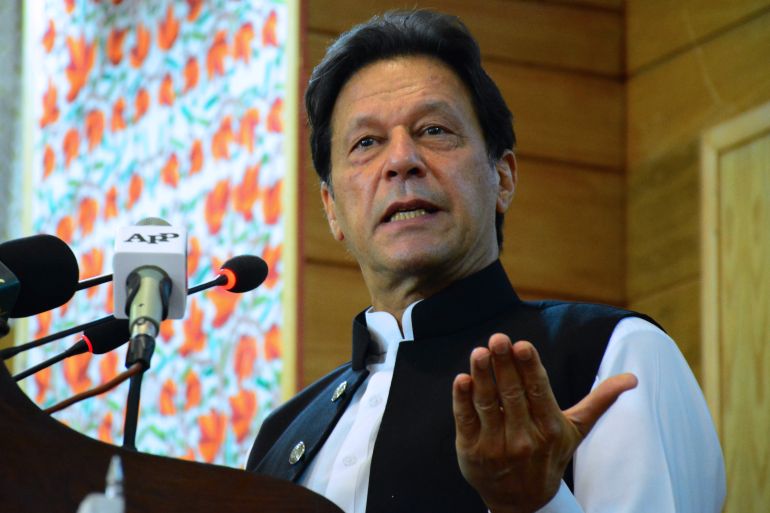Pakistan’s Khan accuses rival Sharif of ‘playing India’s game’
Imran Khan attacks former three-times premier Nawaz Sharif over the latter’s criticism of country’s powerful military.

Islamabad, Pakistan – Pakistan’s Prime Minister Imran Khan has accused political rival and former three-times premier Nawaz Sharif of “playing India’s game” by criticising the country’s powerful military, as a bitter political feud deepens in the South Asian nation.
Khan, leader of the Pakistan Tehreek-e-Insaf (PTI) party that came into power in 2018, was speaking during an interview broadcast late on Thursday.
Keep reading
list of 4 itemsPakistan opposition leader arrested in corruption case
Is Pakistan’s military interfering in politics?
Indian gov’t ‘sponsors Islamophobia’, Pakistan PM tells UN
“Now he [Sharif] has gone [to the United Kingdom] and is playing India’s game. He is attacking Pakistan sitting over there. He is 100 percent getting backing [from India], he is a coward and without that, he could not be doing anything,” said Khan.
The prime minister was responding to renewed attacks on the government in recent weeks by Sharif, whose Pakistani Muslim League-Nawaz (PML-N) party has joined an opposition alliance in a bid to topple Khan’s government.
Sharif has been living in the UK since last November, when he left Pakistan on medical bail to receive treatment for a blood platelet issue that doctors said threatened his life. He was convicted and imprisoned on corruption charges in 2018, but was granted bail during his appeal.
Earlier on Thursday, Sharif addressed party leaders at a high-level meeting through a video link, accusing the government of using “dual standards of accountability” in its anti-corruption drive.
On Monday, anti-corruption officials arrested Shehbaz Sharif, Nawaz’s younger brother and PML-N president, after his petition for an extension of bail in a corruption case was rejected.
Khan has made the anti-corruption drive a centrepiece of his rule, with his government pursuing cases against the Sharifs, former President Asif Ali Zardari, Jamiat Ulema-e Islam (Fazl faction) chief Fazal-ur Rehman and other leaders.
Several key opposition figures, including Shehbaz Sharif’s son, are behind bars, while others are out on bail as they fight the charges in court.
Critics say the accountability drive has been one-sided, disproportionately targeting Khan’s political opponents, while leaving members of his PTI or its allies largely untouched.
“The [anti-corruption watchdog] seems reluctant in proceeding against people on one side of the political divide […] while those on the other side are being arrested and incarcerated for months and years without providing any sufficient cause,” read a Supreme Court verdict in a corruption case in July.
‘Will we disparage army forever?’
Last month, the country’s main opposition parties, including Sharif’s PML-N, the Pakistan People’s Party (PPP), JUI-F and several other smaller groups launched the Pakistan Democratic Movement (PDM) alliance, taking aim at the country’s military for its alleged interference in governance.
Pakistan’s military, currently led by army chief General Qamar Javed Bajwa, has ruled Pakistan for roughly half of its 73-year history, and retains control over large aspects of the country’s foreign and security policies.
Under Khan, the army has taken an increasing role in governance, working with the government on economic affairs, the response to the COVID-19 crisis and taking a leading role in managing the $60bn China-Pakistan Economic Corridor (CPEC) project.
Khan’s rivals allege he was backed by the military in the 2018 general election, and that the anti-corruption drive has been used to sideline his rivals, a charge he denies.
In the interview on Thursday, Khan equated the military’s frequent takeovers of the country to the “mistakes” of some individuals.
“If in the past, an army chief made a mistake, then will we always disparage the army forever?” he asked. “[The] past is there only to learn from. What have we learned? We have learned that the military’s job is not to run the government.”
Nawaz Sharif was forced by the Supreme Court to step down as prime minister over corruption allegations in 2017, and was convicted and sentenced to a prison term a year later, just days ahead of the general election.
In a speech earlier this week, Sharif accused former Pakistani intelligence chief Zaheer-ul-Islam of threatening to overthrow his government in 2014, when Khan was leading anti-government protests in the capital, Islamabad.
Also on Thursday, Pakistan’s media regulator, a government-run body, issued orders banning the broadcast of speeches or statements by those who have been convicted of a crime or are evading arrest – a further tightening of press freedom under Khan.
International media rights group Reporters Without Borders rates Pakistan 145th out of 180 countries in its World Press Freedom Index.
Asad Hashim is Al Jazeera’s digital correspondent in Pakistan. He tweets @AsadHashim.